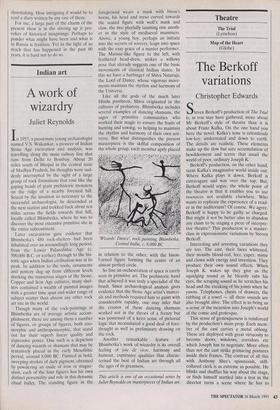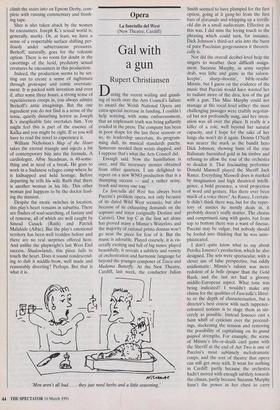Theatre
The Trial (Lyttelton) Map of the Heart (Globe)
The Berkoff variations
Christopher Edwards
Steven Berkoffs production of The Trial is, as you may have gathered, more about Mr Berkoffs style of theatre than it is about Franz Kafka. On the one hand you have the novel. ICafka's tone is relentlessly low-key, understated and down to earth. The details are realistic. These elements make up the slow but sure accumulation of bewilderment and terror that assail the world of poor, ordinary Joseph K.
Berkoffs production, on the other hand, turns Kafka's imaginative world inside out. Where Kafka plays it down, Berkoff is extravagant and way over the top. But, Berkoff would argue, the whole point of the theatre is that it enables you to use resources not available elsewhere. Who wants to replicate the experience of a read- er in the auditorium? Of course. We agree. Berkoff is happy to be guilty as charged. But might it not be better also to abandon any claim to be staging a piece of interpre- tive theatre? This production is a master- class in expressionistic variations by Steven Berkoff.
Interesting and arresting variations they are too. The cast, their faces whitened, their mouths blood-red, leer, caper, mime and clown with energy and invention. They produce their own sound effects. When Joseph K. wakes up they give us the squidging sound as he blearily rubs his eyes, the scraping sound as he scratches his head and the creaking of his joints when he yawns. Telephones, chests of drawers, the rubbing of a towel — all these sounds are also brought alive. The effect is to bring us a sense of the incursion into Joseph's world of the comic and grotesque.
This sense of grotesqueness is reinforced by the production's main prop. Each mem- ber of the cast carries a metal oblong. These are deployed with great virtuosity to become doors, windows, corridors etc which Joseph has to negotiate. More often than not the cast strike grimacing postures inside their frames. The contrast of all this with Anthony Sher's spinsterish, stiff- collared clerk is as extreme as possible. He blinks and shuffles his way about the stage, or finds himself startled into a trot as the director turns a scene where he has to climb the stairs into an Epsom Derby, com- plete with running commentary and finish- ing tape.
Sher is also taken aback by the women he encounters. Joseph K.'s sexual world is, generally, murky. Or, at least, we have a sense of a respectable surface shifting per- ilously under subterranean pressures. Berkoff, naturally, goes for the volcanic option. There is no room for doubt in the cavortings of the lurid, predatory sexual creatures he encounters in this production.
Indeed, the production seems to be set- ting out to create a sense of nightmare through grotesque and comic overstate- ment. It is packed with invention and even if, after some three hours, a strong sense of repetitiveness creeps in, you always admire Berkoffs antic imaginings. But the one ingredient you do not find is a sense of the tense, quietly disturbing horror as Joseph K.'s inexplicable fate overtakes him. You might feel this is part of the essence of ICafka and you might be right. If so you will have to read the novel to experience it.
William Nicholson's Map of the Heart takes the eternal triangle and injects a bit of contemporary bite into the formula. A cardiologist, Albie Steadman, is 40-some- thing and in need of a break. He goes to work in a Sudanese refugee camp where he is kidnapped and held hostage. Before departing he tells his wife Ruth that there is another woman in his life. This other woman just happens to be the doctor lead- ing the mission.
Despite the exotic switches in location, this play's heart remains in suburbia. There are flashes of soul-searching, of fantasy and of remorse, all of which are well caught by Sinead Cusack (Ruth) and Patrick Malahide (Albie). But the play's emotional territory has been well trodden before and there are no real surprises offered here. And unlike the playwright's last West End success, Shadowlands, this piece fails to touch the heart. Does it sound condescend- ing to dub it middle-brow, well made and reasonably diverting? Perhaps. But that is what it is.
'Men aren't all bad . . . they just need herbs and a little seasoning.'



























































 Previous page
Previous page